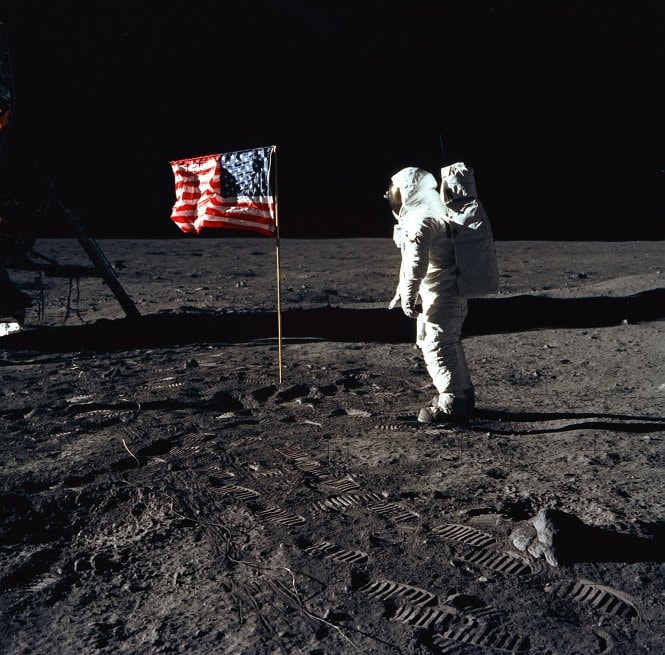The Battle for the Moon is About to Begin
In the context of the number of countries and companies investing in plans to access and exploit the Moon, organizations and experts have called on the United Nations (UN) to soon have common laws to "manage" the Moon before it is too late.
 |
| Astronaut Neil Armstrong in a historic photo on July 20, 1969, when he set foot on the Moon and planted the American flag there - Photo: NASA |
A story that has recently attracted much public attention is the auction of a bag containing soil and rock samples brought back by American astronaut Neil Armstrong in New York, held on the 48th anniversary of Armstrong's first moon landing.
The story would not have been so noisy if it were not for the past mistake that caused NASA to lose the lawsuit to regain ownership of the bag from the buyer, lawyer Nancy Lee Carlson in Chicago.
That legal battle is actually just a small part of the larger issues surrounding space exploration.
And that is also the reason why For All Moonkind is urging the UN to soon have laws to protect the sites where the six Apollo missions landed and the artifacts retrieved from the Moon to avoid disputes similar to the Armstrong bag case.
Need for Moon mining laws?
According to Bloomberg News, the basic legal basis for space activities is the 1967 UN Outer Space Treaty. The central foundation of this treaty is to ensure that space is not under the sovereignty or ownership of any country.
The treaty also prohibits testing of nuclear weapons in space and does not restrict the peaceful use of the Moon and other space features. The United States has signed the agreement.
In 1979 the UN General Assembly also adopted the Moon Agreement, which stipulated that the Moon's natural resources were the “common heritage of mankind”.
At the same time, a new international body would govern the use of those resources “as exploitation of these resources becomes fully feasible.” However, the United States and most countries with space programs have not signed that agreement.
On the other hand, some countries, including the United States and Luxembourg, have passed other laws that recognize legal ownership of resources that private companies retrieve from space.
While legal scholars are still debating whether such laws conflict with the provisions of the Outer Space Treaty that oppose states' right to possess space resources, the fact is that countries and private companies are very eager to invest in and develop space conquest projects.
“What we need to do is create, essentially, a UNESCO for space,” said Michelle Hanlon, a Connecticut-based lawyer. “There needs to be a discussion about the commercialization of space, and right now there isn’t one.”
In fact, NASA raised this issue six years ago, at the time of the Apollo 11 mission anniversary, in a detailed report titled “How to Protect and Preserve the Historical and Scientific Value of the U.S. Government’s Lunar Relics.”
The Moon - the mine of the future?
Located about 239,000 miles (384,633 km) from Earth, the Moon is large and relatively close, with a rich deposit of helium and other resources. At least five countries are planning manned missions to the Moon.
China, for one, is also busy evaluating the potential for exploiting helium-3, a non-radioactive isotope that is very rare on Earth but extremely abundant in the moon's crust.
In 2013, China became the third country to make a soft landing on the Moon, and then used a rover to explore the Moon for more than two years. The country now plans to launch another probe, Chang'e 5, in 2018 and bring back soil samples from the Moon.
According to the ambitious roadmap, Beijing plans to put people on the Moon by the mid-2030s.
Meanwhile, India's unmanned spacecraft Chandrayaan-2 is also being designed to make a "soft" landing on the Moon in 2018. US billionaire Elon Musk has announced that his space transportation company SpaceX has a contract to take the first two tourists on a tour around the Moon in 2018.
Also next year, Google's Lunar X Prize competition will award $30 million to engineering teams that can successfully launch, land, and operate a vehicle on the lunar surface.
Meanwhile, Russia and Japan are also considering their own moon missions. Even the US has announced plans to return to the moon after NASA recently admitted it doesn't have enough money to send people to Mars.
The UN's International Court of Justice could be the venue for international disputes, but it is unclear where, if any, litigation over cultural or commercial property on the Moon would be heard.
And for concerned groups like For All Moonkind, this legal vacuum is clearly no longer a story of the future.
|
According to TTO
| RELATED NEWS |
|---|
